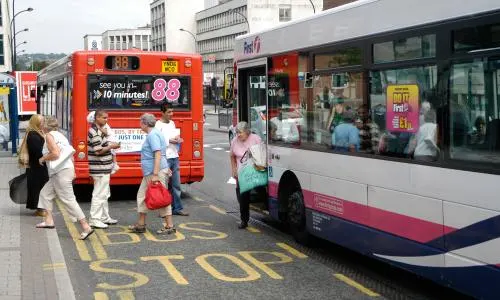
LONDON, UK: The Department for Transport (DfT) has introduced new rules across Britain. All local buses or coach service are required to provide audible announcements and visual displays identifying the route and direction, each upcoming stop, and the beginning of any diversions.
The Government has provided £4.65 million in funding for the smallest bus and coach companies, and the DfT says the changes will be implemented gradually, with almost all vehicles required to comply by October 2026. The new requirements will help people make journeys more easily.
According to the DfT, there is “patchy provision” for audible announcements across the country, with only 30% of buses outside London providing this information. This puts disabled people wanting to travel by bus or coach at a major disadvantage.
Government says clear audible and visible information will also benefit non-disabled people, helping those who are travelling on an unfamiliar bus route, and giving passengers the confidence that they will not be left stranded at the wrong stop late at night.
According to Roads and Accessibility Minister Richard Holden, “Everyone deserves to take the bus with confidence, and this is a massive boost for passenger independence. Simple and effective audible and visible information should be a baked-in feature of a modern bus service to help people reach their destination, wherever they travel in Great Britain.”
According to Department for Transport, audio will be available through induction loop systems. All new vehicles introduced after October 2024 must also include visible information which can be seen by a wheelchair user when travelling in a rearward-facing wheelchair space.
Bus and coach services in Britain are an important part of the country’s public transport network, providing millions of people with affordable and reliable transport options every day.
New funding of £226.5 million will reinforce delivery of local bus services across England
There are several major bus and coach companies operating in Britain, including Stagecoach, National Express, Arriva, and FirstGroup. These companies operate a range of services, including local bus routes, intercity coach services, and airport transfers.
In addition to these major operators, there are also many smaller independent bus and coach companies providing services in specific regions or for specific purposes.
Most cities and towns in Britain have a local bus network that serves the surrounding area, with fares typically ranging from a few pence to a few pounds. Intercity coach services are available to connect major cities and towns across the country, with prices varying depending on the distance travelled and the level of service provided.
One notable aspect of bus and coach travel in Britain is the use of Oyster Cards and contactless payment methods, which make it easy and convenient to pay for bus and coach journeys without the need for cash.
Overall, bus and coach services play a vital role in providing affordable and accessible transport options for people across Britain, particularly those who do not own a car or who are looking for a more environmentally friendly way to travel.
Rotala plc acquires Johnsons Henley’s entire bus service business and fleet